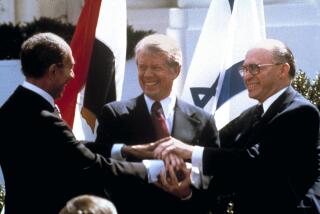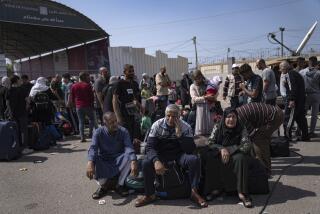In Egypt, Muslim Brotherhood showing cracks in its solidarity
The Muslim Brotherhood has expelled five of its youth members in a purge signaling that Egypt’s most potent political force is unwilling to tolerate dissent within its ranks as it heads toward parliamentary elections in September.
The dismissals are an indication that the Brotherhood’s ideological and organizational rigidity, which buttressed it against decades of persecution by former President Hosni Mubarak, may be cracking as its young members yearn for wider political and religious freedoms in a new Egypt.
Those who were drummed out the group Monday are influential voices — among them lawyer Islam Lotfy — who recently founded their own political party rather than join the Brotherhood’s new Freedom and Justice Party. Their disobedience was a provocative challenge and came days after the Islamic organization expelled another member, Abdel Monem Aboul Fotouh, for defying its wishes by running for president.
The Brotherhood is expected to win as many as 25% of the seats in parliamentary elections. It is outmaneuvering secular political parties that have emerged after the revolution that overthrew Mubarak’s three-decade police state in February. But its generational and ideological differences suggest that the Brotherhood’s conservative elders can no longer command loyalty from all of its estimated 600,000 members.
“The Muslim Brotherhood is out of step,” Lotfy said. “It is against the concept of revolution. Its literature never called for a revolution to change the government. That was too radical. They wanted to gradually change society from within.
“I used to think like that,” he added, “but it got us nowhere. We were like the man pushing the stone up the hill and having it roll back over him.”
For many of its young members, and for society at large, the Brotherhood’s vague political agenda is worrisome. Its leaders describe it as a moderate Islamic movement, but its stands on limiting the rights of women and non-Muslims contradict a revolution not rooted in Islamic ideology. Lotfy said his party, Egyptian Current, will be more tolerant and youth-driven.
“The decision to expel young Brotherhood members shows the absolute control conservatives have over the group, especially members of the politburo, who are known for their religious radicalism,” said Nabil Abdel Fattah, an analyst from Al Ahram Center for Political and Strategic Studies in Cairo. “Those traditionalists and conservatives consider young members and their thoughts a threat.”
Two of those dismissed told the Egyptian media that the Brotherhood leadership did not conduct an investigation, which is normally done before a member is expelled. They said older Brotherhood figures met with them and tried to dissuade them from starting the Egyptian Current, but showed no interest in understanding the youths’ political concerns.
“No one can force me to be a member of a political party,” Lotfy said in explaining why he refused to join the Freedom and Justice Party.
Amro Hassan in The Times’ Cairo bureau contributed to this report.
More to Read
Start your day right
Sign up for Essential California for news, features and recommendations from the L.A. Times and beyond in your inbox six days a week.
You may occasionally receive promotional content from the Los Angeles Times.







